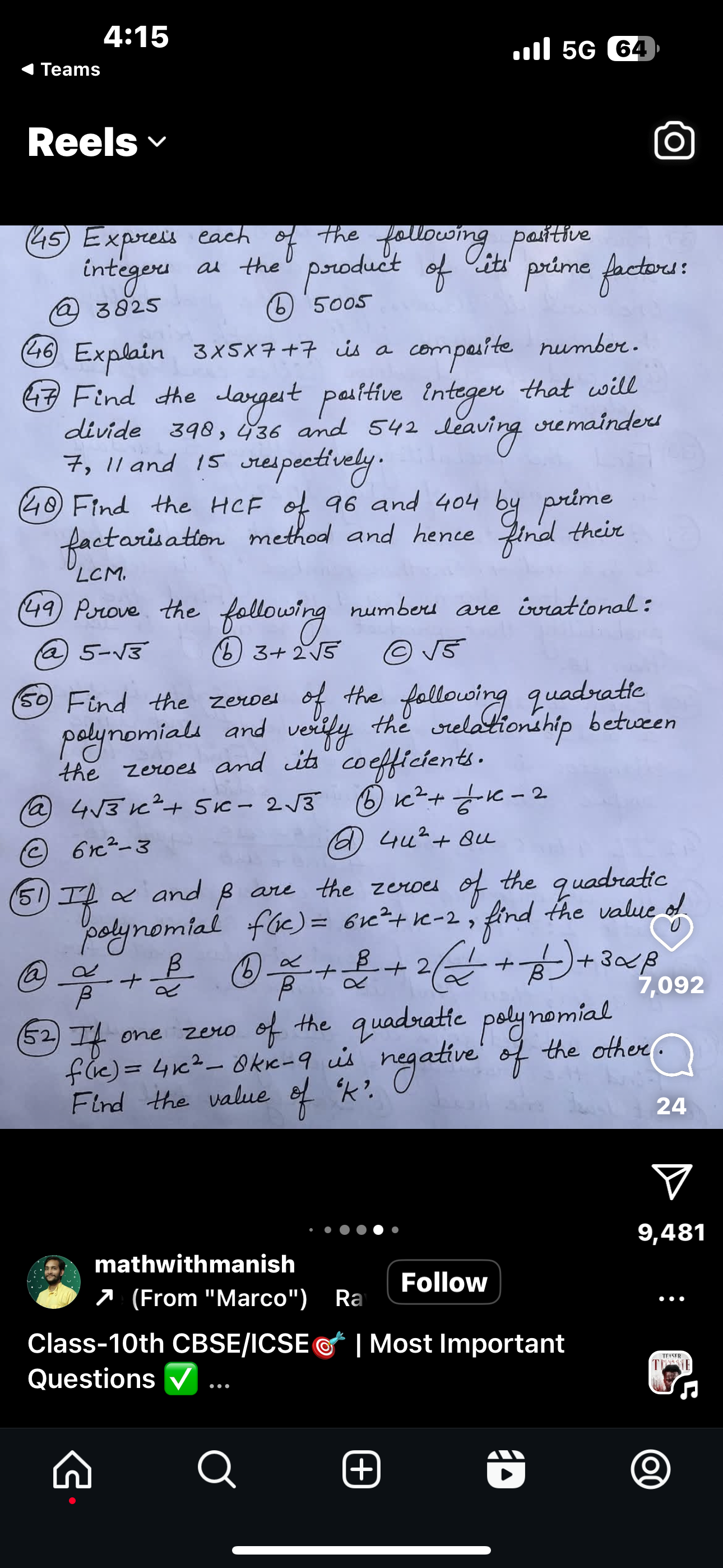45. Express each of the following positive integers as the product of its prime factors: 3825 and 5005. 46. Explain why 3 × 5 × 7 + 7 is a composite number. 47. Find the largest po... 45. Express each of the following positive integers as the product of its prime factors: 3825 and 5005. 46. Explain why 3 × 5 × 7 + 7 is a composite number. 47. Find the largest positive integer that will divide 398, 436, and 542 leaving remainders 7, 11, and 15 respectively. 48. Find the HCF of 96 and 404 by prime factorization method and hence find their LCM. 49. Prove the following numbers are irrational: 5−√3, 3+2√5, √5. 50. Find the zeros of the following quadratic polynomials and verify the relationship between the zeros and its coefficients: a) 4√3x² + 5x - 2√3, b) x² + 6x - 2, c) 6x² - 3, d) 4u² + 8u. 51. If α and β are the zeros of the quadratic polynomial f(x) = 6x² + x - 2, find the value of (α/β) + (β/α) + (1/α) + (1/β) + 3αβ. 52. If one zero of the quadratic polynomial f(x) = 4x² - 8kx - 9 is negative of the other, find the value of k.

Understand the Problem
The question consists of several math problems related to prime factorization, composite numbers, finding HCF, irrational numbers, and quadratic polynomials among others. Each part requires different mathematical techniques to solve.
Answer
The prime factorization of 3825 is $3^2 \times 5^2 \times 17$, and for 5005, it is $5 \times 7 \times 11 \times 13$.
Answer for screen readers
The prime factorization of 3825 is $3^2 \times 5^2 \times 17$, and for 5005, it is $5 \times 7 \times 11 \times 13$.
Steps to Solve
- Prime Factorization of 3825
To express 3825 as a product of its prime factors, divide it by the smallest prime number, which is 3.
$$ 3825 \div 3 = 1275 $$
Next, divide 1275 by 3 again:
$$ 1275 \div 3 = 425 $$
Now, 425 is not divisible by 3, so we move to the next prime number, which is 5:
$$ 425 \div 5 = 85 $$
Next, divide 85 by 5:
$$ 85 \div 5 = 17 $$
Now, 17 is a prime number.
So, the prime factorization of 3825 is:
$$ 3825 = 3^2 \times 5^2 \times 17 $$
- Prime Factorization of 5005
Now, we do the same for 5005. Start with the smallest prime, which is 5:
$$ 5005 \div 5 = 1001 $$
Next, divide 1001 by the next prime number, which is 7:
$$ 1001 \div 7 = 143 $$
Then, divide 143 by 11:
$$ 143 \div 11 = 13 $$
Now, 13 is a prime number.
Thus, the prime factorization of 5005 is:
$$ 5005 = 5 \times 7 \times 11 \times 13 $$
The prime factorization of 3825 is $3^2 \times 5^2 \times 17$, and for 5005, it is $5 \times 7 \times 11 \times 13$.
More Information
Prime factorization allows us to express a number as the product of its prime components, which is useful in various areas of mathematics, including number theory and algebra.
Tips
- Confusing composite numbers with prime numbers. Remember, a composite number has factors other than 1 and itself.
- Not testing for divisibility by the smallest primes first; always start with 2, then move to 3, 5, etc.
AI-generated content may contain errors. Please verify critical information